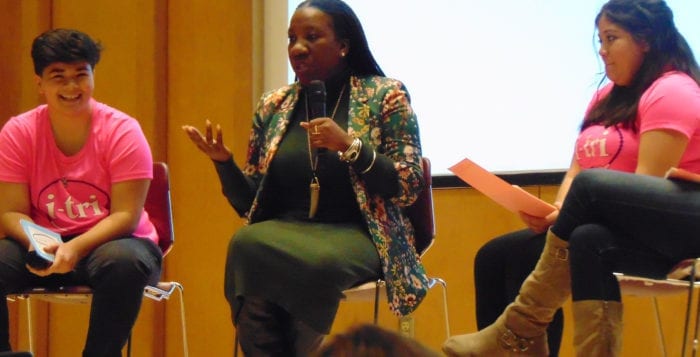Tarana Burke brings #MeToo conversation to SBU

Long Island men and women are prepared to keep the #MeToo conversation going in their communities after an appearance by the movement’s founder, Tarana Burke, at Stony Brook University Jan. 28.
More than 500 people filled the Sidney Gelber Auditorium in the Student Activities Center for #MeToo … #LIToo, a Q&A with Burke led by three young women of i-tri girls, a free program working to raise the self-esteem of middle school-aged girls on the Island’s East End by training them for a triathlon. Abby Roden, Noely Martinez and Maria Chavez posed questions to Burke that covered a range of topics, from how she felt when the #MeToo movement gained momentum, to empowering survivors of sexual abuse and harassment, to showing empathy when a someone shares his or her story.
Burke, a survivor of sexual violence, said it can be difficult to talk about sexual assaults or harassment because he or she feels isolated.
“The idea behind #MeToo being an exchange of empathy is that if you tell me this thing that is already difficult to say, one of the hardest things in your life, and my first response is, ‘Me too,’ that draws you in,” she said. “Regardless of what else is discussed, we have an automatic connection now.”
Giving advice for those who may not be able to say “me too” when a survivor shares a story, Burke said the best thing to do is ask what he or she needs. If the person says nothing, don’t keep asking.
After the #MeToo movement went viral Burke felt crippled. She said she stopped reading comments on her social media posts, even though most responses were thoughtful.
“I had people telling me I was too ugly to get raped, sexually harassed,” Burke said, adding that she is thick-skinned, and didn’t let the comments get to her. “‘You look like a man.’ Just awful, awful things.”
The movement also affects the LGBTQ community — something Burke said is personal for her, as her daughter identifies as queer and gender nonconforming. She said many young people in the LGBTQ community deal with sexual abuse, and it’s important they tell their stories, too.
“Survivors of sexual violence, we’re not victims,” Burke said. “That’s why we call ourselves survivors. We have solutions, we have answers and we have the experience.”
Attendees said the forum was uplifting and meaningful.
“It was very empowering and definitely brought the community together,” said Cassandra Gonzalez, a graduate student at LIU Post. “It just brings awareness to the #MeToo movement.”
Retired teacher Terry Kalb, of Wading River, said Burke is skilled at connecting others through experiences, calling the forum “beyond inspiring.”
“I liked the fact that there was such emphasis on the intersectionality of this issue,” Kalb said. “I think it’s very important that the vast majority of the people who are marginalized with domestic violence issues, sexual harassment issues and sexual violence issues — all people — are afforded a voice. This just can’t be about celebrity issues; it has to be about people who are often powerless to be able to respond. That they be the focus, because that’s where the most damage is done.”
Updated Feb. 1 to add additional quotes from Tarana Burke.






